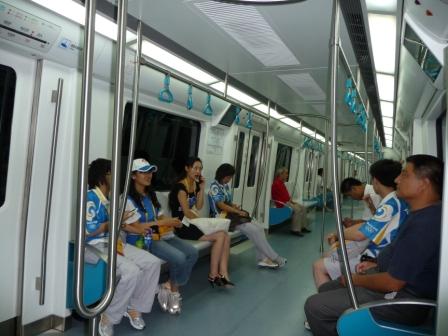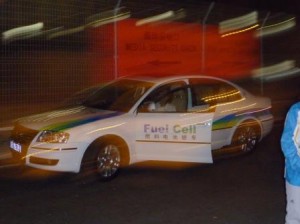
In preparation for the Olympics, the Beijing authorities have implemented a range of measures to ensure a smooth transport experience for the anticipated half a million visitors to the Olympics held in a city which is already home to 17 million people. Three subway lines and some 3,800 compressed natural gas buses have been added. Alternate driving days have been implemented based on the last digit of vehicles’ license plates since July 20, while older vehicles with higher levels of emissions have been banned from the city during the Games.
In addition, 70% of all government cars have been taken off the road for the duration. All this, with the goal to reduce the 3.3 million vehicles in Beijing by half during the Games. This is noticeable – most of the vehicles on the street are busses and taxis.
I travelled part of the way to the park by metro on Wednesday with Olympics Minister Tessa Jowell, (who says ministers are chauffeured everywhere?). It is efficient, easy to navigate and mercifully air conditioned, (Beijing has also installed 200MW of wind energy in recent years) and your mobile phone works underground.
However, the journey from the centre of Beijing needs four changes and can take about an hour. There is only one rail option and it requires a lot of walking and stairs, disabled access is not good. Busses in Beijing are complicated and slow, despite efforts to reduce traffic.
Travelling by taxi is cheap but haphazard. There is no taxi rank near the park. I tried to flag down a cab on a six lane highway outside the park in monsoon rain conditions on Thursday in a desperate attempt to get to the rowing venue. Not much fun.
There is an urban myth that taxi drivers have been ordered to learn some phrases of English. This is nonsense. If you don’t have a book of “cheat cards” with clear instructions in Mandarin describing exactly where you want to go you have no chance. Even if you do, some taxi drivers are semi-literate and their knowledge of the city geography can be as hazy as the atmosphere. A taxi driver yesterday stopped to summon two young women to help to translate for us. This sums up the attitude here, everybody smiles and wants to help.
London has pledged to be the “public transport games” and I am confident that we can do better than Beijing in this area. Stratford will be served by the Central and Jubilee lines, the Docklands Light Railway, Eurostar and the exciting Olympic Javelin link to Kings Cross. There will be numerous bus options and whilst London cabbies may not be fluent in Mandarin or Cantonese, they know their way round their city.
The next twelve months will be critical in turning the pledge in to a detailed execution plan and deliver tangible results.
This post also appears at www.bbc.co.uk/london

